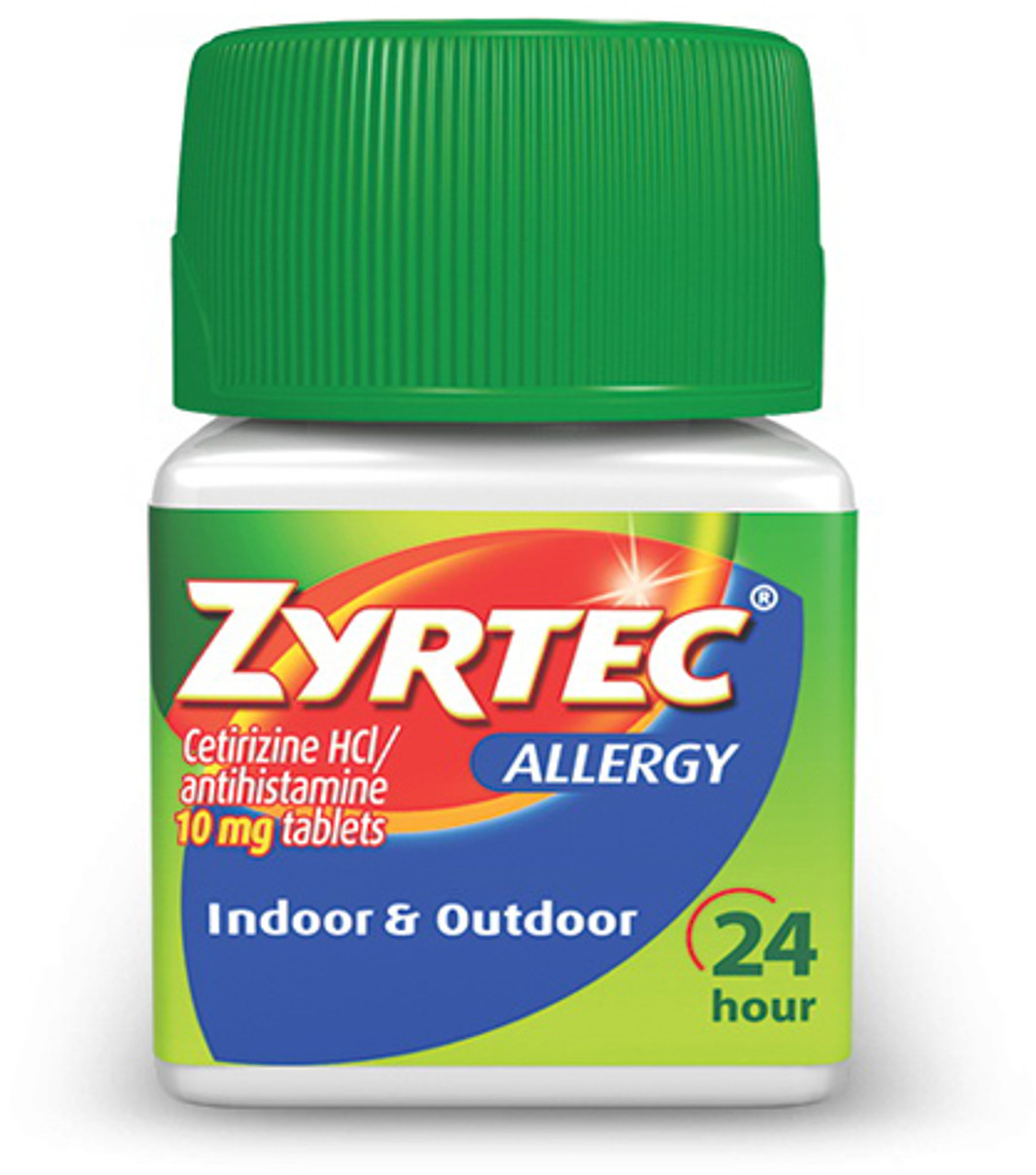(2.45)
Based on 40 studies
| Side Effect | Affected |
|---|---|
| Urticaria (skin rash) | 5% |

Image for illustration purposes only. Actual medication may appear different.
Buy Zyrtec
No Prescription Needed

Image for illustration purposes only. Actual medication may appear different.
Highlights
- Reduces itching and skin symptoms in all age groups
- Safe for long-term use, including in young children
- Can reduce need for strong topical steroids
- May help prevent asthma in allergic children
- May cause drowsiness and dry mouth
Cetirizine is effective at reducing itching and other skin symptoms in both children and adults with atopic dermatitis
| Study Summary | Study Type | Studied Population | Results |
|---|---|---|---|
|
📄
Cetirizine helped reduce itching and other symptoms of atopic dermatitis in adults, with better results at higher doses (40mg). The medication was most effective at reducing itching, redness, and skin thickening compared to placebo.
|
Clinical Trial |
Total Patients: 178
Severity: not available Age: 18+
|
Higher doses of cetirizine were more effective at improving symptoms, with 40mg showing the best results |
Cetirizine helped reduce itching and other symptoms of atopic dermatitis in adults, with better results at higher doses (40mg). The medication was most effective at reducing itching, redness, and skin thickening compared to placebo.
Dose ranging study: cetirizine in the treatment of atopic dermatitis in adultsLong-term use of cetirizine is safe, even in young children. Studies showed no negative effects on behavior, thinking ability, or physical development when used for up to 18 months
| Study Summary | Study Type | Studied Population | Results |
|---|---|---|---|
|
📄
Cetirizine was found to be safe for long-term use in young children with atopic dermatitis. The medication showed similar or fewer side effects compared to placebo over 18 months of treatment.
|
Clinical Trial |
Total Patients: 817
Severity: not available Age: 12-24 months
|
This was primarily a safety study |
Cetirizine was found to be safe for long-term use in young children with atopic dermatitis. The medication showed similar or fewer side effects compared to placebo over 18 months of treatment.
Prospective, long-term safety evaluation of the H1-receptor antagonist cetirizine in very young children with atopic dermatitis. ETAC Study Group. Early Treatment of the Atopic ChildCetirizine can help reduce the need for strong topical steroids in patients with moderate-to-severe atopic dermatitis
| Study Summary | Study Type | Studied Population | Results |
|---|---|---|---|
|
📄
Long-term use of cetirizine in infants with atopic dermatitis helped reduce the need for stronger topical steroids, especially in patients with more severe disease. The medication also significantly reduced the occurrence of hives compared to placebo (5.8% vs 16.2%).
|
Clinical Trial |
Total Patients: 817
Severity: not specified Age: 12-24 months
|
Long-term use of cetirizine in infants with atopic dermatitis helped reduce the need for stronger topical steroids, especially in patients with more severe disease. The medication also significantly reduced the occurrence of hives compared to placebo (5.8% vs 16.2%).
Long-term treatment with cetirizine of infants with atopic dermatitis: a multi-country, double-blind, randomized, placebo-controlled trial (the ETAC trial) over 18 monthsIn children with atopic dermatitis who are allergic to grass pollen or dust mites, cetirizine may help prevent or delay the development of asthma
| Study Summary | Study Type | Studied Population | Results |
|---|---|---|---|
|
📄
In infants with atopic dermatitis who were allergic to grass pollen or house dust mites, cetirizine treatment for 18 months helped prevent or delay the development of asthma. This protective effect was particularly strong and lasted for 36 months in children allergic to grass pollen.
|
Clinical Trial |
Severity: not available Age: 1-2 years
|
Cetirizine prevented/delayed asthma development in sensitized infants |
In infants with atopic dermatitis who were allergic to grass pollen or house dust mites, cetirizine treatment for 18 months helped prevent or delay the development of asthma. This protective effect was particularly strong and lasted for 36 months in children allergic to grass pollen.
A double-blinded, randomized, placebo-controlled trial of cetirizine in preventing the onset of asthma in children with atopic dermatitis: 18 months' treatment and 18 months' posttreatment follow-upIs Zyrtec Right For Me?
-
You are 6 years or older
-
You have allergy symptoms like itching, sneezing, or runny nose
-
You have symptoms from hay fever or other upper respiratory allergies
Interested in eczema products?
As a member of the Lemma Health community, you'll stay up to date with research, hear about new products, and get exclusive access to discounts.
How Lemma Health Works
Discover effective treatments
Fill out a 3 minute questionnaire to find evidence-based treatments that work for you.
Meet your provider
Consult with a board-certified dermatologist. Discuss your treatment options and receive prescriptions.
Get treatment
Treatments are delivered to your door. Free of charge, of course.
Receive ongoing care
Your treatment team is available 7 days a week for questions, support, and guidance.
Ready?
Your journey with lemma health

Discover effective treatments with board‑certified dermatologists.
Get prescriptions for immediate relief.

Get your medications.
Design a plan for sustained relief with your personal care coordinator.

Experience less itch, reduced inflammation, better sleep, and improved wellbeing.

Review progress with your care team and fine-tune your plan.

Ensure that you have everything you need to maintain your relief.
Don't worry - your coordinator will remain available to you.

Enjoy 24/7/365 access to your dedicated care team.

Discover effective treatments with board‑certified dermatologists.
Get prescriptions for immediate relief.

Get your medications.
Design a plan for sustained relief with your personal care coordinator.

Experience less itch, reduced inflammation, better sleep, and improved wellbeing.

Enjoy 24/7/365 access to your dedicated care team.

Ensure that you have everything you need to maintain your relief.
Don't worry - your coordinator will remain available to you.

Review progress with your care team and fine-tune your plan.
Illustrative journey. Individual timelines and results may vary.

Ready for better skin health?
At Lemma Health, we provide evidence-based skin care. Access dermatologists in all 50 states - appointments available within 3 days. Receive your medications delivered. Message your dedicated care team 24/7/365.
What are others saying?
The following comments are sourced from publicly available forums, including Reddit. They reflect personal opinions and anecdotal experiences, and do not constitute medical advice. Lemma Health does not verify the accuracy, completeness, or authorship of these statements, nor does it endorse any specific treatment, medication, or outcome mentioned. These excerpts are provided for informational purposes only.
No reviews available yet
We collect reviews of treatments from various sources including social media and are not always able to verify whether these have been written by actual patients.